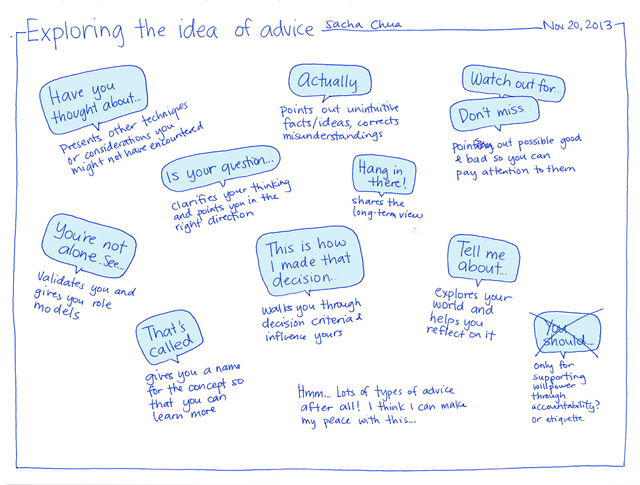Exploring the idea of advice
Posted: - Modified: | connectingI’ve been giving a lot of people advice lately (Google Helpouts, lunches/coffee with people, and so on), which is weird for me because I hedge what I say when I’m writing on my own. My blog posts focus more on the “Here’s what I tried, and here’s how it’s working for me” rather than “You should do X, Y, Z.” When someone asks me a question or describes a challenge they’re facing, though, I have no problems offering suggestions.
I thought about what advice is like and how I can give it more effectively. I realized that there are actually lots of different ways you can help people by talking to them, and it’s not all about saying “You should do X, Y, Z” with minimal understanding of the other person’s situation. Here’s what I came up with:
(Click on the image for a larger version)
I’ve read about and tried a lot of approaches, so I really like the “Have you thought about…” way of helping people. I do that after a few “Tell me about…” so I understand the person’s context and we can build on things they’ve already tried. Sometimes people ask me about how I make decisions too, so I’m happy to walk people through that. (Especially if I’ve already documented it!) On rare occasions, I can tell people the name of the thing they’re looking for (ex: spaced repetition! cloze deletion!) which unlocks all these resources for them. When I’m writing on my own, I like using “Don’t miss… / Watch out for…” to help people save time.
Giving advice still feels odd. I definitely don’t want to become an “I know better than you” sort of person. I like using questions more than declarations anyway. Maybe I’ll find an approach that works for me!
How do you share what you know? How do you help others learn?


4 comments
Douglas G Pratt
2013-12-27T18:29:02ZThanks for the great post! Alan Fine has a book in which he discusses his GROW formula for mentoring/coaching: What is the Goal? What is the Reality? What are Options for achieving the goal? What is the best Way forward? I've found this process useless in speaking with someone once or as part of several conversations. Reflecting back is effective. If someone asks "How would you ...?" you can respond with "How would YOU approach that?" to get a sense of where the other person is coming from. I'll be favoriting your diagram once it is one Flickr.
sachac
2014-01-02T03:01:30ZOoh, I should check that out. (I'm assuming you meant you found the process useful... =) )
I find that I'm more useful (and more comfortable!) organizing and diagramming the other person's thought processes than trying to give advice on my own, although I tend to get enthusiastically carried away recommending other books or websites the person should check out too.
Raymond Zeitler
2013-12-30T03:11:59ZI've learned to give advice indirectly. I don't say (or write) "You should ..." or "If I were you, I'd..." because I don't like the authoritarian tone of that. Instead, I like to relate personal experience. I might respond, "I tried [blah blah] and it worked out well."
sachac
2014-01-02T02:59:56ZYes, absolutely! That works for me too. =)